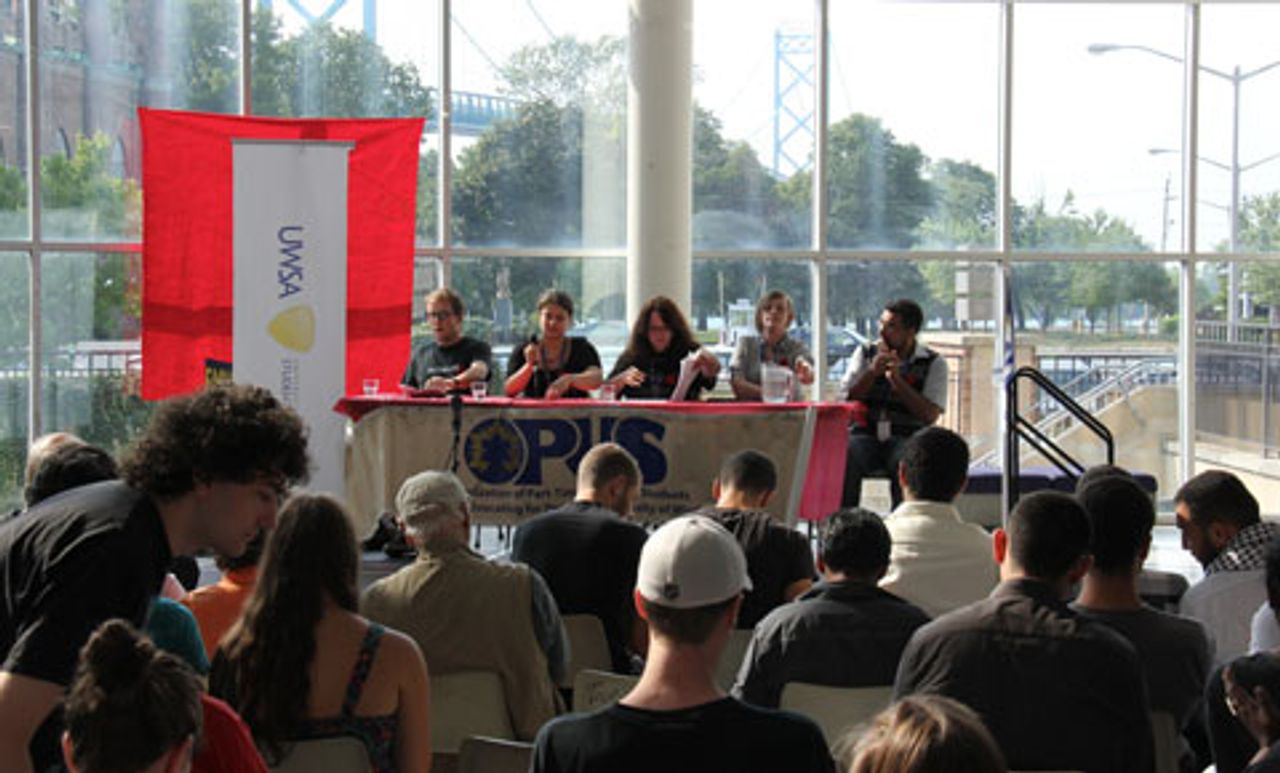Over the past week representatives of CLASSE and other student groups involved in the Quebec student strike have gone on a “Solidarity Tour” throughout Ontario to explain their conception of the strike and appeal for support.
 CLASSE representatives at the meeting at the University of Windsor
CLASSE representatives at the meeting at the University of WindsorReporters from the World Socialist Web Site attended the meeting in Windsor, Ontario where the speakers presented the student strike as a local struggle between the greed of a few in power against the aspirations of the Quebec students.
CLASSE has won support among students for its role in leading the strikes in Quebec. There is mass opposition to the attack on public education, and the anti-democratic measure employed by the government to suppress this opposition. However, the meeting exemplified the way in which CLASSE seeks to limit the strike and prevent it from taking the form of an independent political struggle of the entire working class.
The main speaker at the meeting was Marianne Breton Fontaine, who is running for the National Assembly of Quebec for Quebec Solidaire, a pseudo-left party tied to the capitalist Parti Quebecois. In her presentation, Fontaine contrasted the corporate conception of education, where students should be taught a specific set of skills, with the idea of education as a “social right needed for emancipation.”
Fontaine went on to present her view of how to build the strike. “One day of action should be followed by another, then a week, then an occupation, then if you want, a general strike.”
Fontaine was followed by Audrey Deveault, chairperson of the Dawson Students’ Union at Dawson College in Montreal. Her presentation was focused on details and advice for building student organizations. She specifically warned against calling for general or unlimited strikes because it would “scare off” students accustomed to strikes lasting only a few days.
The final speaker was Hugo Bonin, an activist and occasional spokesperson for CLASSE. After focusing on technical aspects of organizing, Bonin shifted his focus to what he considered the real issue behind fee hikes.
“When you raise fees you change the relation of the student to the university.” Education becomes “commodified” and society begins to view education as an investment instead of a method for self improvement. Reducing spending is only secondary to the Charest government because the fee hikes are not “about money but ending the culture of free public services.”
Nowhere in any of the presentations was there any mention of either the international context or the economic situation. The cuts pushed by the Charest government in Quebec were never even explicitly tied by the speaker to austerity measures in the rest of Canada. As far as these student union leaders and CLASSE activists are concerned, the current strike of a quarter million people is simply the result of years of student organizers putting in the “sweat and tears” to make students amenable to militancy.
By ignoring any objective factors—including the impact of the world capitalist crisis that erupted in 2008—the speakers tried to limit the audience to a provincial understanding. But there is no local solution to the global crisis.
During the question and answer portion of the meeting, the implications of the speakers’ perspective was revealed. A reporter for the World Socialist Web Site addressed the meeting. Pointing to the sympathy for the student strike among broad layers of workers facing their own cuts and the fear exhibited by the Quebec government in the anti-democratic Bill 78, he asked if there were any plans to broaden the student strike into a political strike against the Quebec and Canadian governments.
Fontaine responded that of course they hoped to broaden the struggle, saying, “The goal right now is to go on a political social strike, increasing pressure on the government until we win.” This was the first mention of a “social strike” that evening. Fontaine told the audience that only once in Quebec’s history had “the students called off their strike before the government gave in.” Here, Fontaine is encouraging dangerous illusions in the bourgeois government that has already demonstrated its willingness to violently suppress protests.
As the WSWS noted in its response to a recent interview with CLASSE spokesmen, “CLASSE conceives of the social strike as merely a bigger protest―one moreover organized by the trade unions―not a political general strike aimed at bringing down the Charest Liberal government and developing an independent, cross-Canada movement of the working class for a workers’ government.”
CLASSE wholly accepts the framework under which the tuition hikes are being carried out. In late May, CLASSE, along with other student organizations, agreed to negotiate with the government on the basis of the fiscal demands put forward by the Canadian corporate and financial elite.
One speaker from the audience asked if CLASSE had any plans to “get out the vote” during the next elections. Bonin responded by saying that CLASSE decided “it is not for us to decide how people should vote. If people think voting for the Parti Quebecois would be effective, that’s their right. If they don’t,” that’s fine too.
Behind the pretense of “no politics,” there is a very definite political content, revealed by the fact that one of the speakers is running as a candidate of Quebec Solidaire, which is based on Quebec nationalism and is entirely oriented to the pro-capitalist Parti Quebecois. By taking an agnostic position to politics, CLASSE is stating that the current government and political parties can reasonably express the interests of the students.
“No politics” in fact means no independent working class politics, opposed to the entire political establishment, of which Quebec Solidaire is a part.
